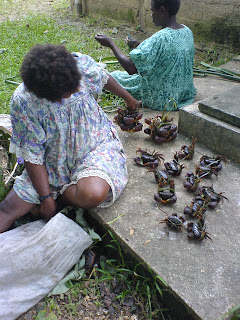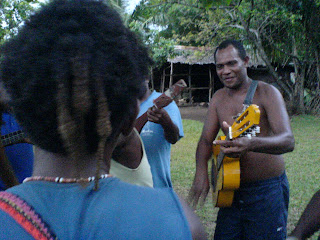 The first island in the Vanuatu group discovered by Spaniards was Espiritu Santo when, in 1606, the Portuguese explorer, Pedro Fernández de Quirós, spied what he thought was a southern continent. Europeans did not return until 1768, when Louis Antoine de Bougainville rediscovered the islands. In 1774, Captain Cook named the islands the New Hebrides, a name that lasted until independence.
The first island in the Vanuatu group discovered by Spaniards was Espiritu Santo when, in 1606, the Portuguese explorer, Pedro Fernández de Quirós, spied what he thought was a southern continent. Europeans did not return until 1768, when Louis Antoine de Bougainville rediscovered the islands. In 1774, Captain Cook named the islands the New Hebrides, a name that lasted until independence.
 It was at this time that missionaries, both Roman Catholic and Protestant, arrived on the islands.
It was at this time that missionaries, both Roman Catholic and Protestant, arrived on the islands. Settlers also came, looking for land on which to establish cotton plantations. When international cotton prices collapsed, they switched to coffee, cocoa, bananas, and, most successfully, coconuts.
Settlers also came, looking for land on which to establish cotton plantations. When international cotton prices collapsed, they switched to coffee, cocoa, bananas, and, most successfully, coconuts. Initially, British subjects from Australia made up the majority, but the establishment of the Caledonian Company of the New Hebrides in 1882 soon tipped the balance in favour of French subjects. By the turn of the century, the French outnumbered the British two to one.
Initially, British subjects from Australia made up the majority, but the establishment of the Caledonian Company of the New Hebrides in 1882 soon tipped the balance in favour of French subjects. By the turn of the century, the French outnumbered the British two to one.




 Many called the condominium the "Pandemonium" because of the duplication of laws, police forces, prisons, currencies, education and health systems.
Many called the condominium the "Pandemonium" because of the duplication of laws, police forces, prisons, currencies, education and health systems. Overseas visitors could choose between British law, that was considered stricter but with more humane prisons, or French law and French prisons, which were somewhat uncomfortable but with better food.









 In the 1960s France opposed Britain's desire to de-colonize the New Hebrides south of the Solomon Islands fearing that the independence sentiment would be contagious in their mineral-rich colonial possessions in French New Caledonia.[6]
In the 1960s France opposed Britain's desire to de-colonize the New Hebrides south of the Solomon Islands fearing that the independence sentiment would be contagious in their mineral-rich colonial possessions in French New Caledonia.[6] The first political party was established in the early 1970s and originally was called the New Hebrides National Party. One of the founders was Walter Lini, an Anglican Priest, who later became Prime Minister. Renamed the Vanua'aku Party in 1974, the party pushed for independence. A Representative Assembly was created in 1975 but dissolved in 1977 after demands for the elimination of government-appointees and immediate independence. In 1979 foreign owners were dispossessed and received compensation from their own governments and a date set for full independence.
 France was unhappy. A couple of significant rebellions occurred on Tanna and Espiritu Santo and paperwork revealed the direct culpability of France in its desire to see Espiritu Santo become a separate French colony.
France was unhappy. A couple of significant rebellions occurred on Tanna and Espiritu Santo and paperwork revealed the direct culpability of France in its desire to see Espiritu Santo become a separate French colony. On 30 July 1980, the Republic of Vanuatu was created.

















 "Whereupon French officials - not British - tore out telephones, air-conditioners and all equipment and furnishings from administrative offices so as to burden the new public service and its budget. Vanuatu was alone in Pacific Islands (sic) in attaining independence at the perceived cost of defeating a more powerful, and openly antagonistic, adversary. Had it not been for Britain, independence would still have been a dream today in Vanuatu."
"Whereupon French officials - not British - tore out telephones, air-conditioners and all equipment and furnishings from administrative offices so as to burden the new public service and its budget. Vanuatu was alone in Pacific Islands (sic) in attaining independence at the perceived cost of defeating a more powerful, and openly antagonistic, adversary. Had it not been for Britain, independence would still have been a dream today in Vanuatu."





















 Since independence, only kastom owners and the government can own land; foreigners and other islanders who are not kastom owners can lease land only for the productive life of a coconut palm - 75 years.
Since independence, only kastom owners and the government can own land; foreigners and other islanders who are not kastom owners can lease land only for the productive life of a coconut palm - 75 years.







